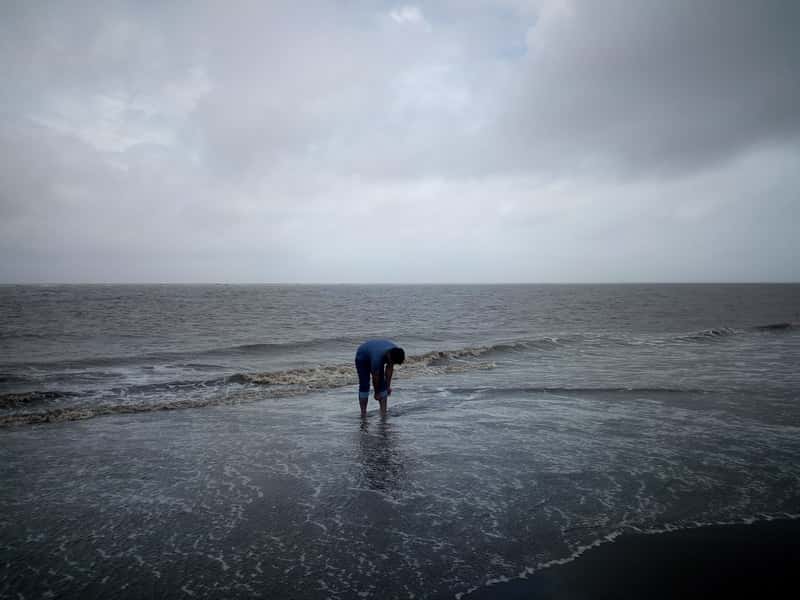Gujarat is located close to the coast and there are many beaches in the state. Many locals from the state often jet set off to a beach town to celebrate the weekend or for a quick break away from the city.
If you are in Ahmedabad, you have a few good options for a beach vacation. There are a few beaches located near the city that are good for vacations. In this article, we present you with options for a quick one- or two-day getaway from Ahmedabad. Here are the best beaches near Ahmedabad for a short and relaxing holiday.
Nearest Beaches From Ahmedabad
1. Hazira Beach

Hazira Beach
The Hazira beach is a quiet spot, ideal for couples and families looking to get away from the noise and hustle of the city life. The unique feature of the beach is its black sand. Located close to the main city of Hazira, the beach is good for camel rides and to enjoy a day out playing sports and outdoor games. There are a few food stalls that serve delicious local cuisine and snacks. Avoid going into the water as the currents are dangerous.
-
- Distance from Ahmedabad: 276 kilometres
- Location: Hazira
Suggested to Read : Places to Visit in Ahmedabad
2. Dumas Beach

Dumas Beach
Although there is much talk of Dumas beach being haunted, it still sees many tourists visiting, albeit during the day.
A beach is a great place for an outing, the hard sand is ideal for playing sports such as football, volleyball and cricket and there are many food stalls at the beach. ATV bike rides are available at the beach. Avoid going in the evening and late at night as the place gets lonely.
-
- Distance from Ahmedabad: 284 kilometres
- Location: Near Surat
3. Tithal Beach

The Tithal Beach
Famous for its black sand, Tithal Beach is always crowded with tourists. The beach has many food stalls serving delicious local snacks such as dabeli, bhajias and roasted corn.
The best time to visit is in the evening when the sun is down. Avoid going in the monsoon as the sea can get rough.
-
- Distance from Ahmedabad: 337 kilometres
- Location: Valsad
Also read : Nightclubs in Ahmedabad
4. Ghogla Beach

Ghogla Beach
The Ghogla Beach is a great place for fun and enjoyment. At this beach, you can go on thrilling water rides such as speedboats and banana boats. The best time to visit in at sunrise or sunset, watching the sun rise or set is a magical experience at this beach.
You can enjoy long walks at Ghogla and collect some beautiful shells; it is a good romantic experience, too.
-
- Distance from Ahmedabad: 361 kilometres
- Location: Diu
5. Devka Beach

Devka Beach
Not as popular as the Jampore Beach, but if you love to have a good time away from crowds, you can consider visiting the Devka Beach. Just like the other beaches in Daman, at Devka there are food stalls and beach shacks too. There is also a large parking area at the entrance of the beach. Swimming at the beach is not allowed as the sea is unsafe for swimming.
-
- Distance from Ahmedabad: 362 kilometres
- Location: Daman
Also Check : Weekend Getaways from Ahmedabad
6. Jampore Beach

Jampore Beach
Daman is a top holiday destination, and one of the best places in the Union Territory is the Jampore beach. Always crowded with tourists, the beach has great activities to enjoy. Camel rides and enjoying seafood at the beach are the two best experiences at Jampore.
-
- Distance from Ahmedabad: 368 kilometres
- Location: Daman
7. Ahmedpur Mandvi

Ahmedpur Mandvi
This 7-kilometre beach is excellent for a picnic or a day out. There is plenty of adventure sports to enjoy, you can go ATV biking, parasailing and even speedboat riding. There is banana boat rides to thrill you at this beach and a few beach shacks around where you can relax for hours on end.
-
- Distance from Ahmedabad: 369 kilometres
- Location: Nargol
8. Mandvi

The Mandvi Beach
Mandvi Beach is the most popular beach in Gujarat. Great for a day out, there is a lot of activities to do here. At the beach, you can go on camel rides, enjoy swimming, making sand castles and do a lot more.
The Vijay Vilas Palace is located close by, it is an awesome place to visit if you love sightseeing and architecture. If you plan on spending a few days at Mandvi, there are resorts near the beach for accommodation.
-
- Distance from Ahmedabad: 384 kilometres
- Location: Mandvi
Also Check : Hill Stations near Ahmedabad
9. Chorwad Beach

Chorwad Beach
The Chorwad beach is located in the fishing town of Junagadh. A quaint beach, the place is ideal for a weekend getaway, especially for couples. There are a few water sports activities available and you can go on boat rides, too.
Some fishermen allow you to accompany them on a fishing trip, it is a great experience. There are a few cottages available for rent near Chorwad Beach for overnight stays.
-
- Distance from Ahmedabad: 389 kilometres
- Location: Junagadh
10. Nargol Beach

Nargol Beach
A quiet beach, Nargol is great for a one-day break away from the city of Ahmedabad. Yet to be explored completely, the beach is cosy and serene. You can enjoy long walks or play outdoor games. If you love nature to spend time exploring the few unexplored spaces at this beach.
-
- Distance from Ahmedabad: 389 kilometres
- Location: Nargol
11. Porbandar Beach

Porbandar Beach
Porbandar might be famous for being the birthplace of Gandhiji, it is also a good weekend getaway spot. There are many places to see around the Porbandar beach and the beach is serene and calm.
It is a nice place to experience a relaxed holiday, there are benches around the beach where you can relax or you can even explore the area by taking a camel ride. There is also a walking track at the beach.
-
- Distance from Ahmedabad: 397 kilometres
- Location: Porbandar
These are the best beaches near Ahmedabad for a holiday or a one-day picnic. Most of them are safe to swim and offer you a lot of outdoor activities to enjoy. If we had to choose, we would pick the Ahmedpur Mandvi or the Jampore Beach, they’re both amazing.
If you want to know more about these beaches or other cool things to do near Ahmedabad, we will be glad to help you with suggestions. Send us your questions in the comments section.
Book hotels in Ahmedabad for a stress-free stay experience.






















